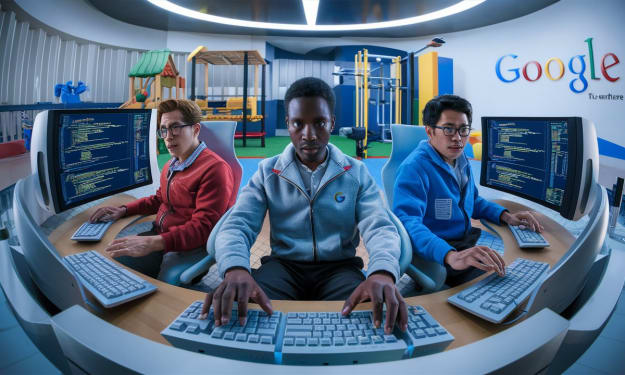Technological Frustration
Discussing the emotional responses that arise from technical difficulties, glitches, or malfunctions.

In the vast landscape of modern life, technological frustration often finds its way into the hearts of people around the world. It is an experience that transcends individual stories, affecting countless individuals in various ways.
Picture a bustling office, filled with the hum of computers and the clicking of keyboards. Amidst the busy atmosphere, a collective sigh of frustration can be heard when a network outage disrupts the workflow of an entire team. The air becomes heavy with impatience and irritation as productivity comes to a halt.
Across the globe, in a small apartment, a student stares at a flickering screen, desperately trying to retrieve a corrupted file. With every failed attempt, a sense of helplessness seeps in, mingling with the mounting anxiety of an impending deadline. The technological glitch becomes a formidable obstacle, standing between the student and their academic success.
In a cozy living room, a family gathers around a television, eager to watch a much-anticipated program. But as the screen freezes and pixelates, the excitement turns to disappointment. Frustration fills the room as they navigate a labyrinth of tangled cables, hoping to restore the lost connection and salvage the evening's entertainment.
In a crowded airport, travelers anxiously glance at their smartphones, seeking a stable internet connection to communicate with loved ones or access important information. Yet, the slow loading speeds and dropped calls evoke a palpable sense of exasperation. Their emotional connection to the world outside becomes strained by the limitations of technology.
In the quiet corners of a coffee shop, individuals sit alone, their faces illuminated by the glow of laptops. Yet, beneath their focused expressions, lies a simmering frustration. They battle with software glitches, crashes, and lost data, their creative endeavors interrupted by the capricious nature of technology.
Technological frustration extends beyond these examples, permeating countless aspects of daily life. It affects professionals striving for efficiency, students seeking knowledge, families yearning for connection, and individuals pursuing their passions. It is an emotional burden that transcends borders and demographics, uniting people in their shared experiences of exasperation and disappointment.
However, in the face of technological frustration, resilience emerges. People adapt, seeking solutions, collaborating with others, or calling upon experts for assistance. They learn from their experiences, becoming more adept at navigating the complexities of the digital realm. And, with each technological triumph, the moments of frustration become stepping stones on the path to growth and empowerment.
In a world where technology continues to evolve and shape our lives, the emotional responses to its glitches and malfunctions remind us of our shared humanity. They serve as reminders that behind the screens and devices, there are individuals who strive to overcome obstacles, reclaim control, and find solace in the ever-evolving landscape of technology.
Technology frustration is a ubiquitous experience in our modern, interconnected world. It encompasses the emotional responses that arise when we encounter technical difficulties, glitches, or malfunctions. In a mere instant, the seamless integration of technology into our lives can be disrupted, leaving us feeling exasperated and helpless.
In our reliance on technology, we have come to expect efficiency, convenience, and seamless functionality. When these expectations are not met, frustration takes hold. It may manifest as impatience, annoyance, or even anger. We become acutely aware of our dependence on technology and the disruption it causes when it fails to perform as intended.
Technical issues can surface in various forms: a frozen computer screen, a slow internet connection, a malfunctioning smartphone app, or a software bug. These setbacks have the power to interrupt our work, compromise our plans, and even hinder our personal connections.
The emotional toll of technology frustration is palpable. Helplessness often accompanies these moments, as we may lack the technical knowledge or resources to resolve the issue independently. We seek solutions, scouring online forums, seeking advice from friends, or reaching out to technical support. Yet, despite our efforts, the problem may persist, deepening our frustration and amplifying our sense of powerlessness.
The stress and anxiety that accompany technology frustration can be overwhelming. Deadlines loom, important tasks remain incomplete, and the fear of missing out grows. We may question our own abilities, doubting our competence in the face of these technological hurdles. The emotional weight becomes burdensome as we navigate the complex landscape of technology, searching for answers and resolutions.
However, amidst the frustration lies an opportunity for growth and resilience. Each encounter with technology frustration provides a chance to learn, adapt, and develop problem-solving skills. We become more adept at troubleshooting, expanding our technological knowledge, and finding alternative solutions.
Moreover, technology frustration reminds us of the importance of empathy and support. We can find solace in shared experiences, seeking comfort and guidance from others who have encountered similar obstacles. Collaboration and collective problem-solving become powerful tools in overcoming technology frustration, fostering a sense of community in the digital realm.
Ultimately, technology frustration is a reminder of our human vulnerability in the face of complex systems. It highlights the interplay between our emotional well-being and the digital landscape we inhabit. By acknowledging and addressing our frustrations, we can cultivate a healthier relationship with technology, one that allows us to navigate its challenges with resilience, patience, and a sense of perspective.
About the Creator
Enjoyed the story? Support the Creator.
Subscribe for free to receive all their stories in your feed.






Comments
There are no comments for this story
Be the first to respond and start the conversation.